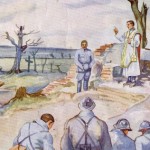 Love is the strongest thing known to man. This only makes sense when you remember that we were wrought in love and formed from the substance of God’s love. How could we not be made for love?
Love is the strongest thing known to man. This only makes sense when you remember that we were wrought in love and formed from the substance of God’s love. How could we not be made for love?
However, I find that there are a lot of counterfeits out there to the agape kind of love to which God is calling us (and He’s calling us to Himself, who is love). It reminds me of an ad that appeared in the very first issue of Mad magazine, titled “Beware of Imitations!” In it, there’s a newsstand with 30 different magazines, all with titles that are variations of Mad: Mid, Mod, Med, Mod, Mord, Mard, Madd, Maddd, Shmad, Admay, etc. The proprietor of the store is trying to palm a copy of Mud off on the kid who is standing there.
Sometimes, of course, we confuse eros love for agape love, or worse yet, we confuse lust or infatuation with love. Relationships built on lust or infatuation have a very short half-life. Sometimes in romantic relationships, what we’re really in love with is the idea of being in love and of having somebody to call or own. This is simply a variation on the most common theme of confusing love with pride. In many ways, what we often say is being done out of love is, in reality, quite self-serving.
We also accept lesser forms of love. It feels good to be liked and loved, and so it’s natural that we would show more love to those who love us. This is where love shows itself to be the strongest and toughest, for true love expresses itself not only towards those who reciprocate but even towards those who not only don’t reciprocate but who, in fact, mistreat us or hate us.
Here’s how Jesus expresses it: “You have heard it said, ‘You shall love your neighbor and hate your enemy.’ But I say to you, love your enemies, bless those who curse you, do good to those who hate you, and pray for those who spitefully use you and persecute you, that you may be sons of your Father in heaven” (verses 43-45).
We all know how not only Jesus but also the first Christian martyr, St. Stephen, lived out this commandment. But did you know that Hegesippus records a similar kind of love in the life of St. James, the brother of the Lord? The Pharisees and scribes set James on the summit of the Temple so that all the Jews gathered for the Passover in A.D. 62 could hear how James would “set them straight” about who Jesus was.
Here’s how Hegesippus records the story: “They cried aloud to him, and said: ‘O just one, whom we are all bound to obey, forasmuch as the people is in error, and follows Jesus the crucified, do thou tell us what is the door of Jesus, the crucified.’ And he answered with a loud voice: ‘Why ask ye me concerning Jesus the Son of man? He Himself sitteth in heaven, at the right hand of the Great Power, and shall come on the clouds of heaven.’
And, when many were fully convinced by these words, and offered praise for the testimony of James, and said, ‘Hosanna to the son of David,’ then again the Pharisees and scribes said to one another, ‘We have not done well in procuring this testimony to Jesus. But let us go up and throw him down, that they may be afraid, and not believe him.’ And they cried aloud, and said: ‘Oh! oh! the just man himself is in error.’ So they went up and threw down the just man, and said to one another: ‘Let us stone James the Just.’ And they began to stone him: for he was not killed by the fall; but he turned, and kneeled down, and said: ‘I beseech Thee, Lord God our Father, forgive them; for they know not what they do.’
And, while they were thus stoning him to death, one of the priests, the son of Rechab, the son of Rechabim, to whom testimony is borne by Jeremiah the prophet, began to cry aloud, saying: ‘Cease, what do ye? The just man is praying for us.’ But one among them, one of the fullers, took the staff with which he was accustomed to wring out the garments he dyed, and hurled it at the head of the just man. And so he suffered martyrdom; and they buried him on the spot, and the pillar erected to his memory still remains, close by the temple.”
Richard Wurmbrand tells this story: “We were in a prison cell; some 30 or 40 prisoners. The door was unlocked and the guards pushed in a new prisoner. He was dirty like we were. We had not washed ourselves in 3 years. So he was dirty, and we were dirty. He was shorn and had the striped uniform of a prisoner. In the half darkness of the cell we did not recognize him, but at a certain moment, one of us exclaimed, ‘This is Captain Popescu, I recognize him!’
Captain Popescu had been one of the worst torturers of Christians. He had beaten and tortured even some of us who were now in the same cell with him. We wondered how he had become a prisoner of the communists and how he had been put in a prison cell reserved for Christians. So we surrounded him and asked him his story.
With tears in his eyes, he told us that a few months ago he sat in his office. The soldier on duty knocked at the door and said, ‘Outside is a boy of 12 or 13 who has a flower for your wife.’ The captain scratched his head. He did not remember that it was his wife’s birthday, but in any case, he allowed the boy to enter.
The boy entered with the flower in his hand, very shy, but very decided, and said, ‘Comrade Captain, you are the one who has put my father and mother in prison. Today is my mother’s birthday. I have the habit every year on this day, out of my little pocket money, to buy a flower for her. Because of you, I have no mother to gladden today. But my mother is a Christian and she taught me since I was a little child to love my enemies and to reward evil with good. Because of you, I have no mother to gladden today, I thought to give joy to the mother of your children. Please take this flower to your wife and tell her about my love and about the love of Christ.’
It was too much even for a communist torturer. He was also a creature of God. He also has been enlightened with the light which enlightens every man who comes into this world. He embraced this child. He could not beat any more. He could not torture anymore. He was no longer useful as an officer of the communist secret police. He came to suffer together with the children of God and was happy for this new state.” (From If Prison Walls Could Speak, by Richard Wurmbrand.)
I often wonder how Jesus, Stephen, James, and this boy could have so much love for those who hated them. And then I remember, “Oh yeah, that’s what God did for me.” Don’t you see, that this kind of love comes from the Father Himself, the Father who so loved the world that He sent His only begotten Son into it? Don’t you see that it comes from the Son Himself who taught us what love was: the just dying for the unjust? And don’t you see that this love must be the work of the Spirit in our lives?
Do you want to be a son or daughter of your heavenly Father? Then (verse 45) learn to love your enemies the way He loves you.
There is a principle in anthropology and sociology that seems to be universal: it’s called reciprocity. Reciprocity means that if I give you something, you feel obligated to give me something back. It was an integral part of the Greek world: go re-read The Odyssey, and you’ll see what I mean! So fundamental is this to our existence that salesmen have found many ways to exploit it. You know those “free” gifts you receive in the mail? They are only one means of making you feel compelled to give something back.
It’s our nature to want to give back what we have received. If I have received the love of God, then my impulse ought to be to return that love to God. In fact, I think the law of reciprocity is God-ordained as a part of the creation order, and I’m only beginning to understand it. Love begets love.
But if what I have received is hatred and persecution, then my Old Man immediately wants to give back hatred and persecution. And here is where agape love triumphs over human nature. Whereas the natural human instinct is to return hatred for hatred, the Christian instinct of love is to return love for hatred. In this way, hatred begets love so that for the Christian love and hate and everything in between all lead to the same response: love!
Even the tax collectors and sinners and the ungodly know how to love those who love them: but it takes the love of Christ to love those who hate you.
If you think about it, there are probably not that many people in your life who actively and personally hate you. There are a lot who hate Christians, but most of them don’t know me. And yet I’m sure there are many people in your life who mistreat you and aren’t nice to you. If you should love even those who hate you, what should be your response to those who mistreat or simply aren’t nice to you?
Today’s commandment: “Love your enemies, bless those who curse you, do good to those who hate you, and pray for those who spitefully use you and persecute you, that you may be sons of your Father in heaven.”
Prayer: Love divine, all loves excelling,
Joy of heaven to earth come down;
Fix in us thy humble dwelling;
All thy faithful mercies crown!
Jesus, Thou art all compassion,
Pure unbounded love Thou art;
Visit us with Thy salvation;
Enter every trembling heart. Amen. (From a hymn by Charles Wesley.)
Points for Meditation:
- Who are the people in your life who hate, mistreat, or are mean to you? How might you show them love?
- Meditate on the love of God. Remember who you would be without the love of God; remember how God loved you before you loved Him; and then apply this principle of love to your life.
Resolution: I resolve to find one way today to show love to someone who isn’t loving to me.
Public Domain James the Just – Menologion of Basil II












